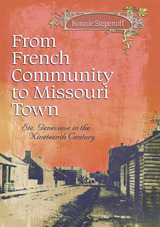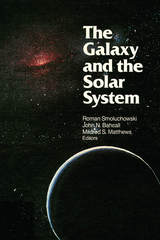3 books by Zweig, Stefan
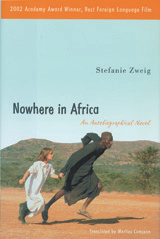
Stefanie Zweig
University of Wisconsin Press
Nowhere in Africa is the extraordinary tale of a Jewish family who flees the Nazi regime in 1938 for a remote farm in Kenya. Abandoning their once-comfortable existence in Germany, Walter Redlich, his wife Jettel, and their five-year-old daughter, Regina, each deal with the harsh realities of their new life in different ways. Attorney Walter is resigned to working the farm as a caretaker; pampered Jettel resists adjustment at every turn; while the shy yet curious Regina immediately embraces the country—learning the local language and customs, and finding a friend in Owuor, the farm's cook. As the war rages on the other side of the world, the family’s relationships with their strange environment become increasingly complicated as Jettel grows more self-assured and Walter more haunted by the life they left behind. In 1946, with the war over, Regina's fondest dream comes true when her brother Max is born. Walter's decision, however, to return to his homeland to help rebuild a new Germany puts his family into turmoil again.
Visit the Web site for the film at www.nowhereinafrica.com
Visit the Web site for the film at www.nowhereinafrica.com
[more]
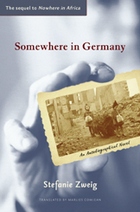
Stefanie Zweig
University of Wisconsin Press
Somewhere in Germany is the sequel to the acclaimed Nowhere in Africa, which was turned into the Oscar-winning film of the same name. This novel traces the return of the Redlich family to Germany after their nine-year exile in Kenya during World War II. In Africa, Walter had longed for his homeland and dreamed of rebuilding his life as a lawyer, yet ultimately he and his family—wife Jettel, daughter Regina, and baby Max—realize that Germany seems as exotic and unwelcoming to them in 1947 as Kenya had seemed in 1938. Hunger and desperation are omnipresent in bombed-out Frankfurt, and this Jewish family—especially Regina, who misses Africa the most—has a hard time adjusting to their new circumstances. Yet slowly the family adapts to their new home amidst the ruins.
In Frankfurt, Regina matures into a woman and, though her parents want her to marry an upstanding Jewish man, her love life progresses in its own idiosyncratic fashion. She develops a passion for art and journalism and begins her professional career at a Frankfurt newspaper. Walter at last finds professional success as a lawyer, but never quite adjusts to life in Frankfurt, recalling with nostalgia his childhood in Upper Silesia and his years in Africa. Only his son Max truly finds what Walter had hoped for: a new homeland in Germany.
Although the Redlichs receive kindness from strangers, they also learn anti-Semitism still prevails in post-Nazi Germany. They partake in the West German “economic miracle” with their own home, a second-hand car, and the discovery of television, but young Max’s discovery of the Holocaust revives long-buried memories. Rich in memorable moments and characters, this novel portrays the reality of postwar German society in vivid and candid detail.
In Frankfurt, Regina matures into a woman and, though her parents want her to marry an upstanding Jewish man, her love life progresses in its own idiosyncratic fashion. She develops a passion for art and journalism and begins her professional career at a Frankfurt newspaper. Walter at last finds professional success as a lawyer, but never quite adjusts to life in Frankfurt, recalling with nostalgia his childhood in Upper Silesia and his years in Africa. Only his son Max truly finds what Walter had hoped for: a new homeland in Germany.
Although the Redlichs receive kindness from strangers, they also learn anti-Semitism still prevails in post-Nazi Germany. They partake in the West German “economic miracle” with their own home, a second-hand car, and the discovery of television, but young Max’s discovery of the Holocaust revives long-buried memories. Rich in memorable moments and characters, this novel portrays the reality of postwar German society in vivid and candid detail.
[more]
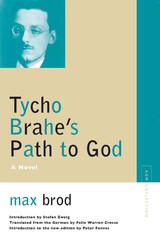
Tycho Brahe's Path to God
A Novel
Max Brod
Northwestern University Press, 2007
Though best known for his editing and posthumous publication of his friend Franz Kafka's writing, Max Brod was a major novelist in his own right. Tycho Brahe's Path to God, widely considered his finest work and viewed by many as a small masterpiece, concerns the relationship between the great Danish astronomer and the younger, intellectually superior Johannes Kepler. Brod's representation of this complicated relation grew out of his acquaintance with the young Albert Einstein, reproduces his struggles with the Expressionist poet Franz Werfel, and strangely anticipates the most famous act Brod would ever perform: publishing Kafka's writings without his permission. As Brahe attempts to create a diplomatic compromise between the old Ptolemaic system of planetary motion and its modern, Copernican revision, Kepler discards the principle of compromise root and branch. Their conflict thus becomes an emblem of the struggle between a weakened tradition and a self-conscious modernity. The novel manages to convey the intimate, emotional reality of a seventeenth-century political conflict as well as the psychological, political, and artistic turmoil of Brod's own time. This revival of the richly allusive and deeply resonant Tycho Brahe's Path to God is a true literary event.
[more]
READERS
Browse our collection.
PUBLISHERS
See BiblioVault's publisher services.
STUDENT SERVICES
Files for college accessibility offices.
UChicago Accessibility Resources
home | accessibility | search | about | contact us
BiblioVault ® 2001 - 2024
The University of Chicago Press


